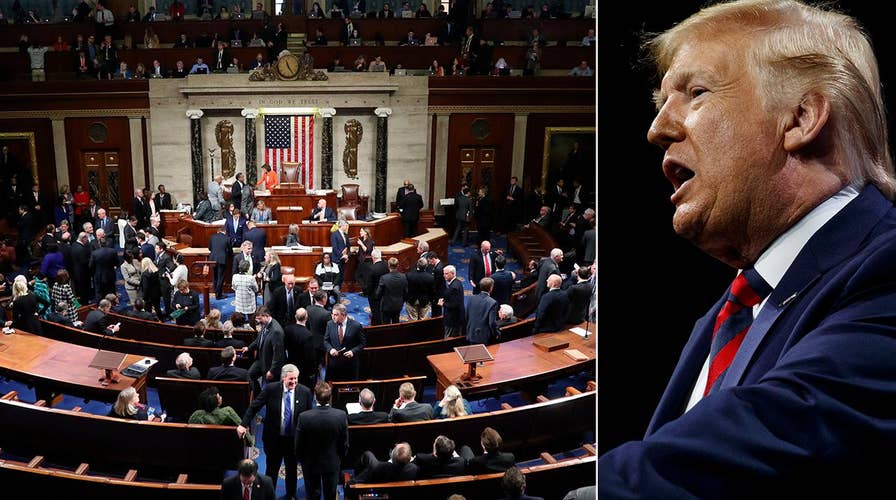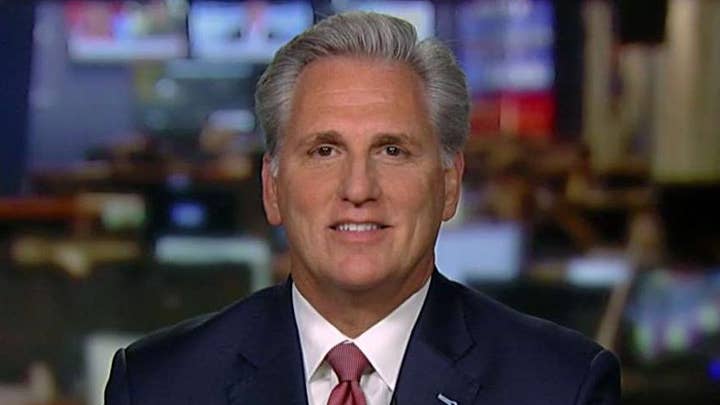White House condemns Democrats' 'unhinged obsession' with impeachment after House approves resolution
The White House releases a statement defending President Trump against Democrats' 'illegitimate' impeachment probe after the House approves rules for the inquiry; John Roberts has more on the reaction.
Republican congressional leaders tore into House Speaker Nancy Pelosi on Thursday after Democrats pushed through formal rules for the impeachment inquiry on the House floor, pointedly asking what changed since she declared in March that she’s opposed to the process absent a presidential offense of “overwhelming and bipartisan” concern.
“We believe in the rule of law. But unfortunately, in Nancy’s House, we do not,” House GOP Leader Kevin McCarthy said at a press conference after the vote on Thursday.
HOUSE APPROVES IMPEACHMENT INQUIRY RULES
McCarthy referenced a March interview with The Washington Post Magazine in which Pelosi declared her opposition to impeachment, saying it’s “so divisive to the country that unless there’s something so compelling and overwhelming and bipartisan, I don’t think we should go down that path because it divides the country. And he’s just not worth it.”
McCarthy asked: “What has changed since March?”
Much, in fact, has happened since then. Former Special Counsel Robert Mueller’s probe ended without finding evidence of criminal collusion between Russia and the Trump campaign. But the spotlight then shifted to Ukraine, after a whistleblower alleged that Trump improperly pressured the country to launch politically related investigations — thus prompting Pelosi to announce the impeachment inquiry.
The House voted largely along party lines on Thursday to approve guidelines for that process going forward, a month after launching it. But Republicans allege those leading the charge have been looking to impeach all along. And they drew close attention to Pelosi’s March warning — especially considering Pelosi even cast a rare vote on the resolution itself, voting for it.
“This is not any cause for any glee or comfort. This is something that is very solemn ... we had to gather so much information to take us to this next step," Pelosi said on the floor Thursday, explaining her current stance. "Nobody ... comes to Congress to impeach the president of the United States, unless his actions are jeopardizing our honoring our oath of office."
She voiced hope that Congress would pursue this course "in a way that brings people together that is healing rather than dividing."
2 DEMS DEFECT ON IMPEACHMENT INQUIRY RULES VOTE
But Republicans argued that while she said in March any impeachment push should be bipartisan, the only bipartisan vote Thursday was to oppose the resolution, as two Democrats broke ranks in opposition. No Republicans supported it.
“In all the hearings, there’s nothing compelling, nothing overwhelming, so the speaker should follow her own words and that bipartisan vote on that floor and end the sham that has been putting the country through this nightmare,” McCarthy said.
The tone at dueling press conferences after the vote signaled that political unity is not likely on the horizon, despite Pelosi's floor comments.
Other top Republicans also went after House Intelligence Committee Chairman Adam Schiff, D-Calif., who is essentially leading the probe right now.
“For one man to turn this country upside down, to have this vote today, our Founding Fathers warned about this in the Federalist Papers,” House Foreign Affairs Committee Ranking Member Michael McCaul, R-Texas, said. “That a future Congress would base impeachment, at some point in time, would base it on partisan politics.”
“Sadly, today in this chamber, their worst fears have been realized,” McCaul said.
Rep. Lee Zeldin, R-N.Y., another top Republican on the Foreign Affairs Committee, said: “Schiff is the prosecutor, the judge, the jury, the chief strategist for lying and leaking.”
And House Judiciary Committee Ranking Member Doug Collins, R-Ga., posed a challenge.
“Here’s my challenge to Mr. Schiff. You wanna be Ken Starr? Be Ken Starr,” Collins said, referring to the special prosecutor who led the investigation into Bill Clinton. “Come to the Judiciary Committee. Be the first witness and take every question asked of you. Starting with your own involvement of the whistleblower.”
Republicans have blasted Schiff in recent weeks over his office's prior contact with the whistleblower who filed a complaint to the agency’s inspector general about President Trump’s July 25 phone call with Ukrainian President Volodymyr Zelensky.
Schiff’s office, earlier this month, said that the whistleblower had reached out to them before filing that complaint in mid-August, giving Democrats advance warning of the accusations that would lead them to launch an impeachment inquiry days later.
“Folks, this ain't over,” Collins said. “Get ready. The cloud that is dropping will be dropping on their heads, because process matters and substance will always win out in the end, and this president has nothing to worry about.”
But on the other side of the House, Schiff and other top congressional Democrats touted the passage of the resolution and defended their handling of the probe.
“This is a solemn day in the history of our country, when the president’s misconduct has compelled us to continue to move forward with an impeachment inquiry,” Schiff said. “The founding fathers understood that a leader might take hold of the Oval Office, who would sacrifice the national security, who would fail to defend the Constitution, would place his personal and political interests above the interests of the country.”
He added: “They provided us with a mechanism to deal with it and that mechanism is called impeachment.”
Schiff went on to detail what the coming weeks would look like — including public hearings and staff counsel questioning witnesses for “lengthy periods of time,” giving both the majority and the minority 45 minutes each.
The resolution passed Thursday further directs the Intelligence Committee, in consultation with the other committees, to prepare a report on its findings to the Judiciary Committee, which would write any articles of impeachment. In response to GOP complaints about Democrats' selective leaks of opening statements and depositions, the document also authorizes the public release of testimony transcripts, with only sensitive or classified information being redacted. The resolution also allows Republican members to submit written demands for testimony and other evidence, to cross-examine witnesses, and raise objections.
Pelosi announced the Trump impeachment inquiry on Sept. 24, saying at the time that "the president must be held accountable" for his "betrayal of his oath of office, betrayal of our national security, and the betrayal of the integrity of our elections."
The inquiry was opened after a whistleblower complaint alleged that Trump, during a July phone call, pushed Zelensky to investigate former Vice President Joe Biden and his son Hunter as military aid to the country was being withheld.
A transcript released by the White House shows Trump making that request, but he and his allies deny that military aid was clearly linked to the request or that there was any quid pro quo. Some witnesses coming before House committees as part of the impeachment proceedings have challenged that assertion.
The White House, though, has maintained the president did nothing wrong.
"Nancy Pelosi and the Democrats’ unhinged obsession with this illegitimate impeachment proceeding does not hurt President Trump; it hurts the American people," White House Press Secretary Stephanie Grisham said in a statement. "Speaker Pelosi and the Democrats have done nothing more than enshrine unacceptable violations of due process into House rules."
She added: "The Democrats want to render a verdict without giving the Administration a chance to mount a defense. That is unfair, unconstitutional, and fundamentally un-American."
Fox News' Chad Pergram, Tyler Olson, and John Roberts contributed to this report.






















